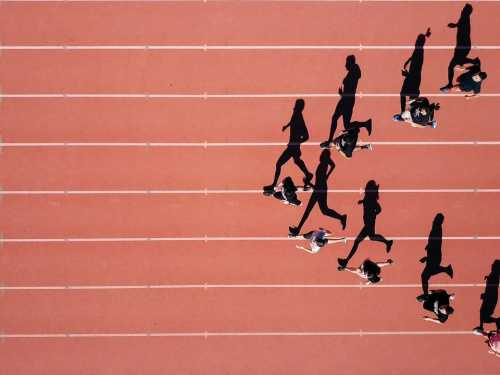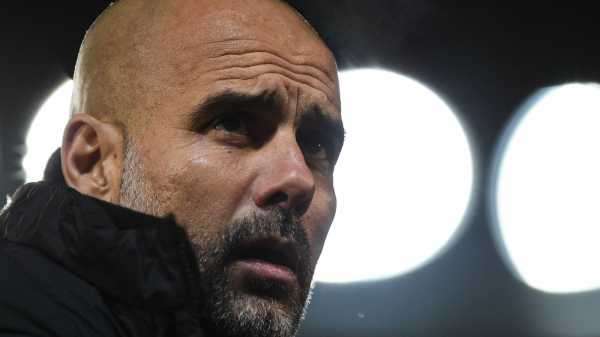
Exceptional is the word that Pep Guardiola uses to describe his Manchester City team and he means it in more than one sense.
Exceptional because they lead the Premier League after winning 15 of their previous 17 games. But also because, increasingly, he believes that his team’s style of play is becoming the exception in this competition. The German influence is here.
Ralf Rangnick will be the managerial opponent when Manchester United visit the Etihad Stadium for the derby on Sunday, live on Sky Sports Premier League. It will be the first time that the two have faced each other in a competitive game but it is unlikely to feel that way for Guardiola.
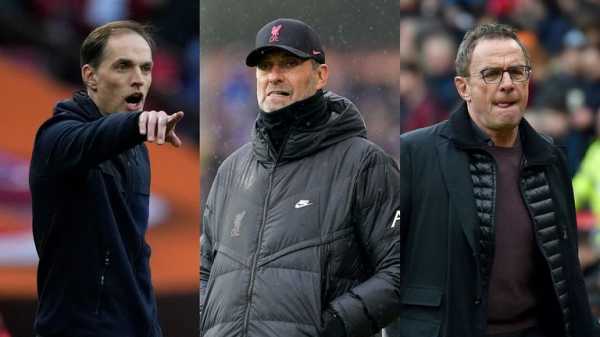
Image: Thomas Tuchel, Jurgen Klopp and Ralf Rangnick have brought the Germany style to England
“With Jesse Marsch arriving at Leeds it is already a tendency, you know,” he tells Sky Sports. “Five teams, important ones, playing this way, it is because what happened in Germany arrived here.”
The five teams to which he refers are all now being influenced by the same coaching school. Marsch was Rangnick’s assistant at RB Leipzig, where Ralph Hasenhuttl, the Southampton head coach, was handpicked to take over from Rangnick in 2016.
Trending
- Chelsea fans chant ‘Abramovich’ during Ukraine tribute | Tuchel: Not the moment
- Abramovich receives £3bn offers | Staveley: He’s been treated unfairly
- Transfer Centre LIVE! Arteta: Arsenal need to go to a different level
- Pep on why German style is not for him
- Arteta on Emirates connection, Auba exit, Saka rise and summer plans
- Merse: Maguire and Ronaldo should be dropped vs Man City
- Lage: I don’t waste time with guys who don’t work hard
- Haas split with Russian driver | Mazepin: I had agreed to all conditions
- Hussain: Warne the greatest to ever play
- ‘Masi was turned’ | New Hamilton-Max doc delivers fresh claims
- Video
- Latest News
Chelsea’s Thomas Tuchel played under Rangnick at Ulm and considers him a mentor. Jurgen Klopp has leaned on those same ideas to turn Liverpool into Guardiola’s biggest rival for the Premier League title during his time in England.
“Five important teams and managers all playing this way. Transitions, playing inside, high pressing, everybody together, it doesn’t matter if we lose the ball because I recover the second one and attack you again, you lose it again and you lose it again. This incredibly good methodology, it is the deep tendency here in England.”
Also See:
Does he understand the appeal?
“It is so attractive when they do it well,” says Guardiola.
“It is so attractive for the spectators and they have had success.”
But it is just not him.
Three years in Germany had an impact, no doubt. “Of course, I learn a lot in Germany. I adapt.” His teams have evolved, playing more quickly on the counter-attack themselves to suit the strengths of the players in the Manchester City squad.
And yet, deep down, there remains a sense that the directness of this style, that willingness to lose possession regularly because the ball can be won back, however attractive, is still alien to him. His principles are his principles and they do not change.
“Listen, I am from Catalunya, you know,” he says.
“My education, my football education, comes from there. And I learn a lot here, I learn a lot in Germany, but my principles come from there. If I were born in Germany alongside Ralf Rangnick’s ideas, Jurgen Klopp’s ideas, whatever, probably I would do it I like this.
“But I feel the football the way I feel it and I cannot change it because they have success. Everyone has to do what they want.”
Guardiola is speaking to Sky Sports in a small room at the Etihad Campus having made his way downstairs following his pre-match press conference on the Friday afternoon before the game.
There, he had suggested that the plan to prevent Manchester United’s counter-attacks would be to sit deep. There was a smirk as he glanced around the room, attempting to make eye contact to ensure the sarcasm had not been missed.
Here, he repeats the claim with that familiar gleam in his eye.
“Yeah, for the first time we are going to play 90 minutes with a block,” he confirms.
It is a joke, of course. The plan will be to manage those transitions. “Almost unstoppable for 90 minutes.” But he will do so with a high defensive line and a team intent on dominating possession. The plan is to stop United “as much as possible by playing football”.
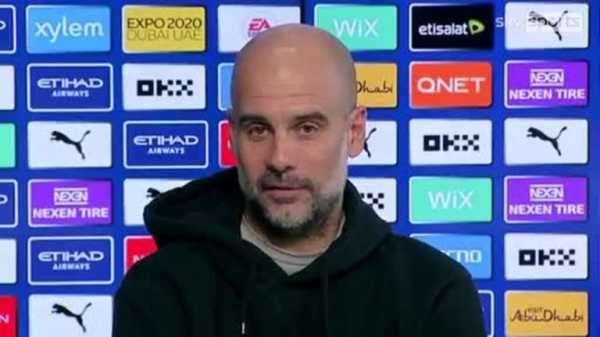
Pep Guardiola speaking to the media before the game against Manchester United
When City are able to achieve that, they can suffocate opponents. For 14 games between September and December, despite maintaining near-permanent residence in the opposition half, they did not concede a single chance from an opposition counter-attack.
That was a feature of the Manchester derby at Old Trafford in November, a game that highlighted the contrast between the more frenzied Liverpool approach to dismantling opponents and the ice-cold ability of Manchester City to impose their will.
Liverpool had beaten United by five goals just a fortnight earlier but the two-goal defeat to City was arguably more emphatic. Guardiola’s team, in his own words, had put United in the fridge. The home side wanted to find a response. They could not even find the ball.
The plan will be “quite similar” on Sunday with only “one or two things we need to adjust” because this is the way with his City now. While others bring the heat, his team cools it down.
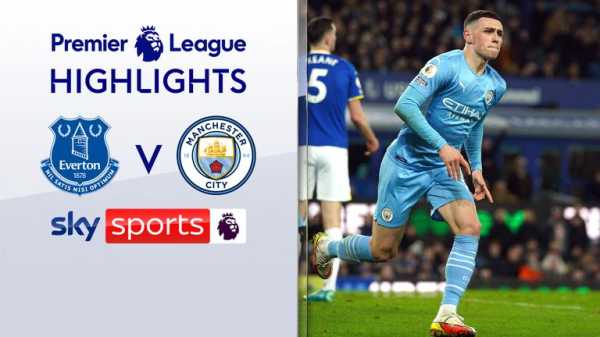
FREE TO WATCH: Highlights of Manchester City’s win at Everton in the Premier League
Teams reflect their manager, but Guardiola is learning to reflect his team too. He is trying to be as patient on the touchline as his players are when probing for openings on the pitch. “I understand more that the players can make mistakes,” he says.
“Before, I was more anxious, more angry. Sometimes I am but I understand because I know they want to do well. I know they want to win against Manchester United. I know they want to win the Premier League. I know they want to win the Champions League.
“Sometimes it is not possible but my anxiousness is not going to change the way they play, you know. After every action I am anxious and angry. But after the action is done, it is gone. I cannot correct this action. So why am I shouting about how they have behaved?
“But sometimes I am anxious because there is a part that does not work and I want to correct it and they do not listen to me and they have to do it but they don’t listen to me. I have to understand at the end that as much as I want to change, I will not change.”


Manchester City
Manchester United
Sunday 6th March 4:00pm Kick off 4:30pm


He will trust in his players. He will trust in the ball. The game has become quicker, a change hastened by this counter-pressing trend, but that ideology forged at Barcelona holds true.
“The footballer is the same now as 50 or 60 years ago. Maybe they are physically stronger because they train better. But the guy who controls the ball, the player from 60 or 70 years ago who was an exceptional player would be able to play today, for sure.”
The game of Rangnick, the game of Klopp and the rest, that is the challenge now. “We have to fight against that,” concludes Guardiola.
“The way we are going to try to do it? We have to play.”
Watch Man City vs Man Utd live on Sky Sports Premier League from 4pm this Sunday; kick-off 4.30pm

Win £250,000 with Super 6!
Another Saturday, another chance to win £250,000 with Super 6. Play for free, entries by 3pm.
Sourse: skysports.com


